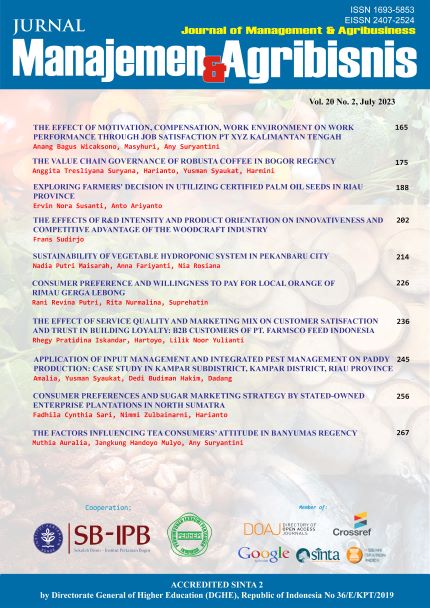The Effect of Service Quality and Marketing Mix On Customer Satisfaction and Trust in Building Loyalty: B2B Customers of PT. Farmsco Feed Indonesia
Abstract
The livestock industry is an economic sector with high potential for generating quality economic growth. This study aims to analyze the effects of service quality and marketing mix on satisfaction, trust, and customer loyalty of PT. Farmsco Feed Indonesia (PT.FFI), as well as to formulate managerial implications that companies can apply to increase customer loyalty. The research design used in this study is quantitative, utilizing a survey approach. The sample consists of B2B (Business to Business) customers of PT. FFI who have been using poultry feed for the past two years. A total of 157 individuals were selected through voluntary sampling. Data were collected through an online survey using a Google Form questionnaire. The independent variables in the study are service quality and marketing mix, while the dependent variables are trust, satisfaction, and loyalty. Data processing and analysis techniques involved descriptive analysis and Structural Equation Modelling. The results indicate that: 1) service quality variables do not have a significant effect on satisfaction and loyalty, 2) the marketing mix has a significant effect on satisfaction and trust, 3) trust has a significant effect on customer loyalty, and 4) managerial implications for increasing customer loyalty include enhancing customer trust to foster long-term relationships.
Keywords: customer loyalty, marketing mix, satisfaction customer, service quality, B2B customers
Authors
Authors who publish with this journal agree to the following terms:
- Authors retain copyright and grant the journal right of first publication with the work simultaneously licensed under a Creative Commons Attribution License that allows others to share the work with an acknowledgement of the work's authorship and initial publication in this journal.
- Authors are able to enter into separate, additional contractual arrangements for the non-exclusive distribution of the journal's published version of the work (e.g., post it to an institutional repository or publish it in a book), with an acknowledgement of its initial publication in this journal.
- Authors are permitted and encouraged to post their work online (e.g., in institutional repositories or on their website) prior to and during the submission process, as it can lead to productive exchanges, as well as earlier and greater citation of published work (See The Effect of Open Access).

